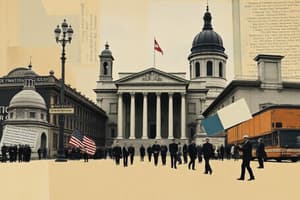Podcast
Questions and Answers
What is a key characteristic of a constitutional monarchy?
What is a key characteristic of a constitutional monarchy?
- Total power resides with the monarch.
- Ruler's power is unlimited and absolute.
- The ruler's power is limited by law. (correct)
- Ruler is chosen by divine right.
What document was significant in limiting the power of the English monarchy in 1215?
What document was significant in limiting the power of the English monarchy in 1215?
- The Divine Right Declaration
- The Magna Carta (correct)
- The English Bill of Rights
- The Social Contract
Which term describes the belief that monarchs are chosen by God?
Which term describes the belief that monarchs are chosen by God?
- Sovereignty
- Divine Right (correct)
- Absolutism
- Social Contract
What was the Glorious Revolution primarily about?
What was the Glorious Revolution primarily about?
What does sovereignty refer to in a governmental context?
What does sovereignty refer to in a governmental context?
What was the primary role of Parliament in England historically?
What was the primary role of Parliament in England historically?
Which of the following best describes autocracy?
Which of the following best describes autocracy?
Which event occurred from 1642 to 1651 and involved a conflict between Parliament and the monarchy?
Which event occurred from 1642 to 1651 and involved a conflict between Parliament and the monarchy?
What concept is encapsulated by the term 'Rule of Law'?
What concept is encapsulated by the term 'Rule of Law'?
What distinguishes absolute monarchy from constitutional monarchy?
What distinguishes absolute monarchy from constitutional monarchy?
Which document was pivotal in establishing the principles of constitutionalism?
Which document was pivotal in establishing the principles of constitutionalism?
In the context of monarchy, what does the term 'nobles' refer to?
In the context of monarchy, what does the term 'nobles' refer to?
The concept of 'divine right' asserts that rulers are chosen by whom?
The concept of 'divine right' asserts that rulers are chosen by whom?
What is the primary purpose of habeas corpus in legal terms?
What is the primary purpose of habeas corpus in legal terms?
What historical significance does the English Civil War hold?
What historical significance does the English Civil War hold?
Which of the following terms best describes a system of government where a single leader holds all power?
Which of the following terms best describes a system of government where a single leader holds all power?
The term 'balance of power' is best described as what?
The term 'balance of power' is best described as what?
Which event is known as the Glorious Revolution?
Which event is known as the Glorious Revolution?
Flashcards
Absolute Monarchy
Absolute Monarchy
A political system where one ruler has absolute and unlimited power.
Divine Right of Kings
Divine Right of Kings
The belief that a monarch's right to rule comes directly from God.
Constitutional Monarchy
Constitutional Monarchy
A system where the monarch's power is limited by a constitution and other laws.
Parliament
Parliament
Signup and view all the flashcards
Bureaucracy
Bureaucracy
Signup and view all the flashcards
Autocracy
Autocracy
Signup and view all the flashcards
Constitution
Constitution
Signup and view all the flashcards
Rule of Law
Rule of Law
Signup and view all the flashcards
Habeas Corpus
Habeas Corpus
Signup and view all the flashcards
Social Contract
Social Contract
Signup and view all the flashcards
Nobles
Nobles
Signup and view all the flashcards
Enlightenment
Enlightenment
Signup and view all the flashcards
Constitutionalism
Constitutionalism
Signup and view all the flashcards
Study Notes
Forms of Government
- Absolute Monarchy: A single ruler holds complete, unrestricted power.
- Constitutional Monarchy: A monarch's power is limited by law, often a constitution.
- Autocracy: Rule by a single, powerful leader holding ultimate authority.
- Bureaucracy: A complex system of officials managing government operations.
- Parliament: A law-making body in some countries.
Key Concepts
- Divine Right of Kings: The belief that rulers are chosen by God and thus have absolute authority.
- Sovereignty: The supreme power or authority of a state, often residing in the government or the people.
- Constitution: A set of fundamental rules governing a country, defining its structure and limits on power.
- Rule of Law: The principle that everyone, including rulers, is subject to the same laws.
- Habeas Corpus: The right to challenge unlawful imprisonment.
- Social Contract: An agreement, explicit or implied, between the people and the government defining their rights and responsibilities.
- Constitutionalism: A government based on a constitution, emphasizing limitations on government power.
- Absolutism: Rule by an absolute monarch who claims and exerts complete control.
Historical Events and Documents
- Glorious Revolution (1688): A significant English political revolution leading to constitutional limits on the monarchy.
- English Bill of Rights (1689): A document further limiting the power of the monarchy in England, enshrining specific rights.
- Magna Carta (1215): A document limiting the power of the English monarchy and establishing basic rights.
- English Civil War (1642-1651): A conflict between Parliament and the monarchy in England, resulting in major shifts in power.
- Parliamentarian: Supporters of Parliament during the English Civil War.
- Royalist: Supporters of the monarchy during the English Civil War.
- Enlightenment: An 18th-century intellectual movement emphasizing reason and individual rights, influencing political thought.
Specific Entities
- Monarch: A single ruler with supreme power, often with a hereditary claim to the throne.
- Czar (Tsar): Emperor of Russia, sometimes holding absolute power.
- Nobles: High-ranking members of society, often holding significant political power.
- Royal Family: The family of a monarch.
- Estates-General: A historical French assembly of representatives, a precursor to modern legislatures.
- Versailles: The palace of French kings, often associated with French absolutism and centralized power.
- Balance of Power: The distribution of power among different groups to prevent domination by any one.
Studying That Suits You
Use AI to generate personalized quizzes and flashcards to suit your learning preferences.




